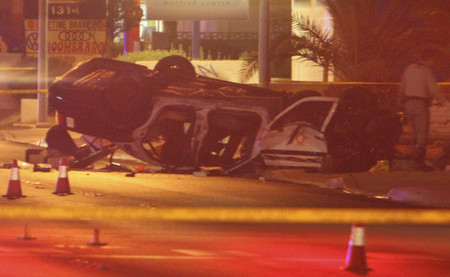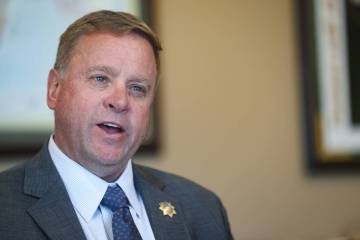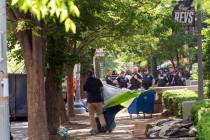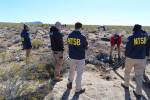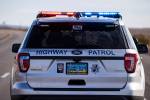Officer fatalities cloud 2009
For the Metropolitan Police Department, 2009 closed as its deadliest year.
Four officers died, including three in crashes while driving department vehicles. The fatal crashes prompted headlines, a public outcry and a revamp of the agency's driving policies.
Yet beneath all that attention, the department's safety record on the road has been steadily improving in recent years, according to agency figures on crashes involving its vehicles.
Since 2007, the frequency of crashes and the costs associated with them have fallen dramatically when measured on a per-mile-driven basis.
The rate of total crashes per 100,000 miles driven has dropped from 3.58 in 2007 to 2.90 in 2009, a 19 percent reduction. During the same period, the rate of at-fault crashes fell from 2.02 to 1.65, an 18 percent reduction.
The Police Department logs a little more than 700 crashes a year, and that number includes even the smallest of fender-benders whether there was damage or not, Risk Management Director Jeff Roch said.
And the rate for costs per 100,000 miles driven, including medical treatment, workers' compensation, property damage and lawsuit settlements, fell 40 percent, though the 2009 figures were compiled through Oct. 8 and included projections.
Dollar costs of police crashes dropped by 46 percent, from $3.9 million in 2007, to $3 million in 2008 and a projected $2.1 million in 2009, according to the Police Department.
Those figures overlap a period of growth for the Police Department, which has added about 600 new officers since 2005 thanks to the More Cops sales tax.
"By no means does that mean no problem. What it means is on a day-to-day basis, Las Vegas Metro does a pretty good job of managing risk," said Steve Ashley, a retired police officer, trainer and risk manager.
Roch attributed the improvement to training and communication about driving safety.
"We talk about this all the time. We push it," he said.
Driving safety became a top priority within the department after the May death of officer James Manor, who crashed while driving more than 100 mph and not wearing a seat belt.
After Manor's death, Sheriff Doug Gillespie formed a panel to study the department's policies.
Since then, traffic accidents have killed two more officers and seriously injured a third. Among the policy changes were more training for newer officers and a cap of 20 mph over the speed limit, except in pursuits.
In announcing the changes in December, Gillespie said they would be accompanied by a change in a department culture that frowns on wearing seat belts.
"What we're truly talking about here in the Las Vegas Metropolitan Police Department is a cultural change in our driving habits," Gillespie said at the time.
Before last year, the last on-duty Las Vegas police officer to die in a crash was in 1979.
Ashley said that indicates the Police Department does a good job of managing risk, but even the best agencies cannot prevent everything.
"If your officers are driving hundreds and hundreds of patrol miles, there is going to be a potential," he said. "Some years you might be lucky; one year you might not. But there is always that potential."
Modern police are masters of multitasking behind the wheel. They drive, watch traffic, scan for problems, listen to their police radios and check their computers.
"They drive all day, every day. It tends to be routine," Ashley said.
Although many people assume police pursuits lead to higher costs and more injuries, routine driving leads to more crashes and injuries because it's far more common than pursuits, he said.
For example, in December 2003 officer Nicholas Farese was approaching the five-points intersection of Eastern Avenue and Charleston Boulevard when his patrol car ran a red light and drove into the path of a van, according to court documents.
Farese saw a green light at a different part of the intersection and missed the red light in front of him, according to his deposition taken during a lawsuit.
The van's driver, Virginia Chavez, suffered knee, back and neck injuries in the collision. She sued and eventually settled for $45,000.
Thirteen months later, officer Milburn "Millie" Beitel wasn't paying attention when he turned his patrol car left in front of oncoming traffic at Rancho Drive and Washington Avenue, according to a lawsuit.
An oncoming vehicle hit Beitel's car, and the driver, Ronald Bean, sued and eventually settled for $49,999, just one dollar under the legal cap for damages in such cases.
In October, Beitel died when he lost control of his patrol car and crashed. Investigators blamed his death on speed -- 71 mph in a 45 mph zone -- and not wearing a seat belt. His partner was seriously injured in the crash.
Those lawsuits were just two of the roughly 90 filed for auto negligence against the Police Department since 2000, according to court records. That figure includes a dramatic spike last year, when more than 20 were filed.
Roch said he couldn't explain the sudden change. "We can't quit put our finger on it," he said.
He couldn't say one way or another whether publicity surrounding the fatal crashes, including one in which the police van of corrections officer Daniel Leach struck a tractor-trailer, might have been a factor in the lawsuit increase.
Just a handful of those cases went to trial. The vast majority were settled.
In the past five years, Las Vegas police have spent at least $470,000 to settle lawsuits stemming from crashes.
Roch said the Police Department tries to settle lawsuits as quickly as possible.
The department also tries to settle claims fast and fairly, which is easier because the department is self-insured and doesn't rely on an outside insurance company, he said.
Though Ashley questioned the effectiveness of a speed limit cap for police -- he believes officers should use discretion based on variables such as road conditions and traffic -- he said the Police Department has a good reputation for being proactive, professional and a leader in risk management.
But even the best police agencies can go only so far in eliminating the risks their officers face every day on the streets.
"No matter how careful you are, stuff is going to happen," he said.
Contact reporter Brian Haynes at bhaynes@reviewjournal.com or 702-383-0281.





